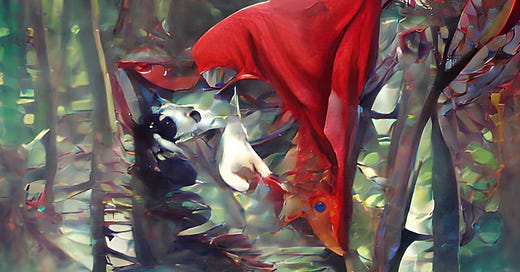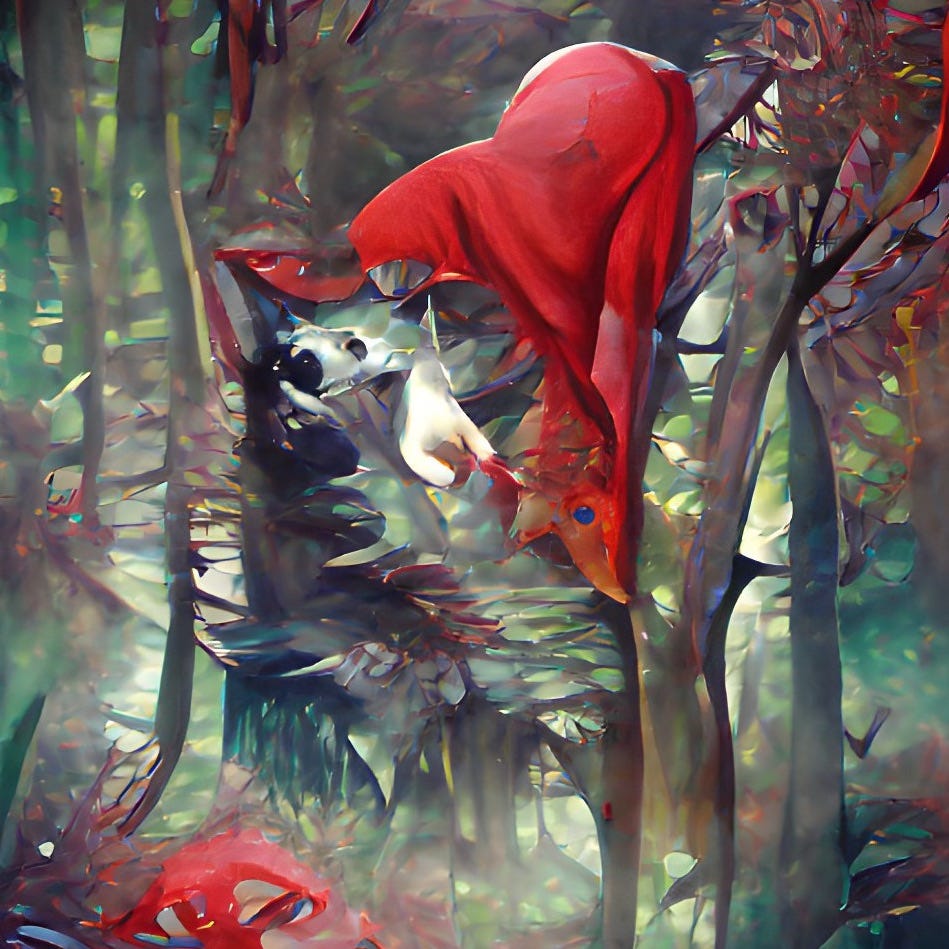Issue 3: Saturday, 15 January 2022
Amongst the Thorns
(620 words)
Deep in the thicket of her sleep she vainly tries to reassemble the scattered pieces of her life.
They surround her like leaves caught upon thorns. One by one she picks them off and examines them. Does this one come before this other? Is there a beginning? An end? To her they seem all alike, all present at once. There is no time, only the infinite now.
Here is one piece. She is lying on her side, wrapped in twisted metal. Centimetres from her face, there is the spinning wheel of a car, the tread of its tyre blurring past her eyes.
Somewhere there is terrible pain. Running through it all, between every piece of memory, the ghastly pain. Pain, and the memory of pain.
She picks up another leaf, another piece of her life. She is in a pink party dress. Her father bends down to kiss her forehead, calling her “Princess”.
Another kiss, soft and gentle on her lips. But this time her eyes are closed, she cannot see who it is.
It is her wedding day. Dressed in white she stands in the church, her heart fluttering with happiness, next to her charming husband. Over near the font, there is a disturbance… but no, that is quite a different piece of life: a story told to her by her mother, a story oft repeated. The baptismal font, the priest, the holy water. And the crazy mad woman, a distant relative, turning up uninvited, screaming insane curses at the baby, having to be dragged away. The shocked face of the priest.
Again comes the pain. Like a red thread it runs through the warp and weft of her mind.
She pushes the pain aside, remembers the car again, the shattered car, the snow of broken glass in which she lies, the wheel of another vehicle almost touching her face, spinning, spinning.
Then there is a prick in her arm. How can she possibly feel that prick, a mere drop in the ocean of her pain? The face of the paramedic, murmuring something kind as the hypodermic slides in. And so the sleep begins.
The hypodermic is just the start. Somehow she knows that her flesh is pierced, penetrated, in a dozen places, by the briar thorns. Their shoots, their clear transparent shoots, flowing with liquid, are all about her, tangling her, entering and exiting the piercings of her body.
Someone, far off, speaks a word. “Rose…”. Is it a flower? She sees the bright red flower in an immediate series of static, unconnected images, the flower in full bloom, the swelling rosehip, the bud, the loose petals withered. They are like playing cards discarded loosely onto a table, no card following or preceding another.
“Rose…”
Or could it be a name? Could it be her name?
At the thought, the leaves, the pieces of her life, suddenly whirl, as though a strong wind has blown up and scattered them yet again, forming another pattern. But this one is no more comprehensible than the last. She despairs of her task. Perhaps there is no sequence, perhaps her life simply consists of these unconnected pieces. Is that what life really is? Is time an illusion? Does one thing follow another?
She picks up a discarded leaf, one she has looked at already.
The kiss. Not her father’s kiss, but a loving, gentle, kiss on her lips, filling her with an access of joy. It was her lover’s kiss.
Now at last she knows its place. That is the last piece, the end of the sequence! She has just been kissed, and he has spoken her name.
She opens her eyes and wakes, and it is as though a hundred years have passed.
© Copyright David R. Grigg. All rights reserved.
About the story
Obviously, this little story toys with the fairy tale of Briar Rose, and tries to cast it into a modern setting without explicitly copying it or its plot-line. I wrote the first version of it about 9 years ago in response to a writing prompt along the lines of “write your own take on a classic fairy tale”. But I have tinkered with it again much more recently.
As well as trying to reflect various elements of the source fairy tale, I was also trying to envisage what it might be like to recover from a traumatic accident which disturbs the sense of identity and memory. There’s probably some influence here of the books of Oliver Sacks, particularly his A Leg to Stand On (1984) in which he describes his recovery from an accident which shattered one leg.
In the Woods
(734 words)
The old woman lives alone in a cottage in the woods.
There might have been a town here once, she sometimes thinks. But all of the people seem to have left. Over time, their houses have fallen down, and trees have grown up through the ruins. Where there might once have been a busy road, now only a narrow footpath leads through the thick forest.
A young girl comes to visit her one day and brings her food. The old woman does not know her name, but she is grateful for the food and for the girl's bright and caring face.
"Thank you, my dear," she says to the strange girl. "You are very kind. Do I know you from somewhere?"
The girl smiles and laughs. "Of course, grandmother. You know me very well."
"Do I? That's good, that's good. You are very kind."
These days are bright, but at night, she can hear something slinking about in the forest. Outside her cottage it moves and mutters and growls, and she is afraid.
In the morning, her fears are gone. She looks about her. Her cottage seems smaller now. Were there not once more rooms? She thinks so, but cannot be sure. Now there seems to be just this one room, with her bed, and a window and a door.
A young man comes to the door. He must be a woodcutter, she thinks, working in the forest. Has she ever seen him before? He is tall and handsome and asks after her health.
"Oh, I'm fine, dear. There's nothing ever wrong with me." He smiles and goes away again. But he must not be working hard, because each day there seem to be more trees in the forest, and it grows a little darker outside her window.
At night, in the dark, she can hear something wild outside, something slinking amongst the trees, then brushing against her door with its long wiry fur, trying to get in. She lies as still as she can, her heart pounding in terror, praying for the morning to come.
In the morning, though, the bright light washes everything away. A young girl comes to visit and brings her food in a basket, with flowers she has picked in the wood. The old woman wonders who the girl is, and why she is so kind.
The old woman moves about the room. There is a vase of flowers here, very pretty. She picks up each flower in turn to examine it. She wonders who brought them, and why.
Something is wrong with the door to the cottage. It will not open no matter how hard she tries. But she has the water and food someone has brought, and after a while she stops trying to open the door.
A handsome woodcutter comes to see her. He asks after her health, and she tells him that she is very well, that she is never sick. Perhaps she should ask him about the door? There was something wrong about a door, she thinks.
A tree grows right outside her window now, it fills her view. The forest must be growing close, she thinks. She wants to go outside to look at it, but for some reason she cannot open her door. After a while, she sighs, and gives it up.
Then there is a terrible night.
She is in her bed when a horrible slinking thing breaks into her cottage. It climbs into bed beside her and she feels its hairiness, smells its foul breath. It paws at her. She screams and screams, and after a moment a woodcutter rushes in to her room and drags the hairy thing out from her bed. There is noise and shouting and lights, and many people crowd in, people she does not know. But at last the evil thing is taken away. She sobs in terror, but the woodcutter tells her it is gone and will not come back.
A young girl comes to see her the next day, bringing food in a basket. The old woman cannot understand why she seems so upset.
"Oh, granny," the young girl says with tears in her eyes, "you must have been so frightened. But you don't need to worry, they've moved that horrible man away to another nursing home."
"Frightened, dear?" says the old woman, admiring the girl's red coat. "Frightened by what?"
© Copyright David R. Grigg. All rights reserved.
About the Story
The fairy-tale inspiration for this should again be obvious. But the particular form of it came from my observations of a relative suffering from extreme dementia, living in a world of her own that only touched upon our world at a few points. It was very sad to see, and I tried to imagine what that must be like from the sufferer’s point of view.
Revisiting the above stories, written some time ago, has turned the trick which I was hoping this newsletter would do: it’s inspired me to start writing again and to come up with something new. This new story isn’t yet ready to share—maybe by next issue—but is also inspired by a traditional tale.
Please feel free to comment or to link to your own fiction. And please help me grow my readership by sharing this post with your friends.





